
XLII Colloquy of the American Weil Society
The Politics and Ethics of Labour
Le 42e colloque de l’American Weil Society se tiendra à Montréal sous le thème de la politique et l’éthique du travail.
L’œuvre posthume de Simone Weil, La condition ouvrière, est en circulation depuis plus de 70 ans, et les textes qui la composent sont encore plus anciens. Et même si ce livre n’est peut-être pas largement lu dans le monde anglophone, les ouvrages les plus lus de Weil, tels que The Need for Roots ou Gravity and Grace, proposent également de longues réflexions sur le travail. Mais malgré les critiques approfondies et subtiles de Weil à l’égard du marxisme, son appel émouvant à faire du travail le noyau spirituel de la société moderne, sa participation engagée à la vie de l’usine et l’accueil enthousiaste de penseurs comme Hannah Arendt, elle n’est pas toujours considérée comme faisant partie du canon des théoriciens post-marxistes du travail. Ce colloque sollicitera des contributions susceptibles d’aider à établir (ou à remettre en question) l’importance de Weil en tant que théoricienne du travail. Nous espérons explorer collectivement l’importance continue de Weil dans notre économie postindustrielle et néolibérale.
Le programme complet et les résumés des présentations sont disponibles ici.
Jour 1—Vendredi, 26 avril 2024
Mots de bienvenu (8:45)
PANEL 1 – WEIL AND THE MARXIST TRADITION(S) (9:00-10:30)
Eric Springsted (Santa Fe): “What Is the Point of ‘Is There a Marxist Doctrine’?”
Samuel O’Connor Perks (University of Manchester): “Simone Weil, the Catholic Worker
Movement, and contested readings of Marx”
Kenneth Novis (University of Oxford): “The Factory Journals as Worker’s Inquiry”
Pause (10:30-10:45)
PANEL 2 – TOWARDS A THEORY OF LABOUR? (10:45-12:15)
Inese Radzins (California State University, Stanislaus): “Method (rather than a theory)
for Considering the Politics of Labour”
Alexandre Crépeau (University of Ottawa): “Impactful and Dignified: Simone Weil and
David Graeber’s Shared Ideal of Work”
Joanna Winterø (Københavns Universitet): “How much against your will?”
Lunch (12:15-2:15)
PANEL 3 – LABOUR IN SOCIAL AND POLITICAL PRACTICE: EDUCATION,
CARE, COMMUNITY (2:15-3:45)
Alexandre Martins (Marquette University): “Insights from Weil for the Challenge of
Moral Destress in Health Care”
Sarah Dunford (Catholic University of America): “Neither Left nor Right: Intertwining
Community and Labour”
Ryan Poll (Northeastern Illinois University): “The Education Crisis and the Sanctity of
Labor in Simone Weil’s Political Theory”
Pause (3:45-4:00)
PANEL 4 – LABOUR AND SPIRITUALITY (4:00-5:30)
Connor Williams (Union Theological Seminary): “Labour (justice) as spiritual exercise
in Weil and Process and Womanist theologians”
Rachel Matheson (McMaster University): “A Little Pile of Inert Matter: Flesh and Body
in Simone Weil’s Spirituality of Work”
Noemi Faustini (Pontificia Università Gregoriana): “Simone Weil’s Concept of Slavery
and Jewish Mysticism”
Jour 2—Samedi, 27 avril 2024
PANEL 5 – WEIL IN CONVERSATION: HEIDEGGER, ARENDT, BATAILLE
(9:00-10:30)
Jacob Wilson (Carleton University): “Weil and Bataille on Political Community”
Robert Reed (Boston College): “Decreative Phenomenology and the Problem of Unjust
Labour”
Peli Meir (University of Haifa): “The Power of Speech and Silence in Weil and Arendt”
Pause (10:30-10:45)
PANEL 6 – CONTEMPORARY APPLICATIONS OF WEIL’S THOUGHT (10:45-
12:15)
Manuel Ruelas (Ind. Scholar): “Where are we standing?”
Alejandra Novoa Echaurren (Universidad de los Andes): “Simone Weil and prerequisite
to dignity of labour in the actual neoliberal society”
Julia Morrow (Wheaton College): “Analyzing 21st century understandings of labour and
gender through a Weillien lens”
Lunch (12:15-2:15)
PANEL ON SIMONE WEIL’S POLITICAL PHILOSOPHY: FIELD NOTES FROM
THE MARGINS (BENJAMIN P. DAVIS) (2:15-3:45)
Discussants: Scott B. Ritner (University of Colorado Boulder)
Sophie Bourgault (University of Ottawa)
Mac Loftin (Harvard University)
Break (3:45-4:00)
AMERICAN WEIL SOCIETY BUSINESS MEETING (4:00-5:30)
Colloque organisé par Max Lewis (Yale) aidé de Christopher Howard (McGill) et de Mauro Rossi (UQÀM) sous l’égide du CRÉ, avec le soutien du Canadian Journal of Philosophy, du GRIN, du GRIPP et du Département de philosophie de l’UQÀM.
Horaire
9:30-9:40 Welcome
9:40-11:00 Julia Driver (UT Austin), “Misplaced Gratitude”
Commentary by Alex Carty (McGill)
11:00-11:10 Break
11:10-12:30 Arash Abizadeh (McGill), “Sorry, not Sorry: The Practice of Conditional Apologies”
Commentary by Guillaume Soucy (UQAM)
12:30-2:00 Lunch
2:10-3:30 Max Lewis (Yale), “The Annulment Thesis and The Dynamics of Gratitude”
Commentary by Melissa Hernandez Parra (UdeM)
3:30-4:00 Coffee Break
4:00-5:00 Stephen Darwall (Yale), “’Much obliged’: On Gratitude and Obligation”
Commentary by Jordan Walters (McGill)
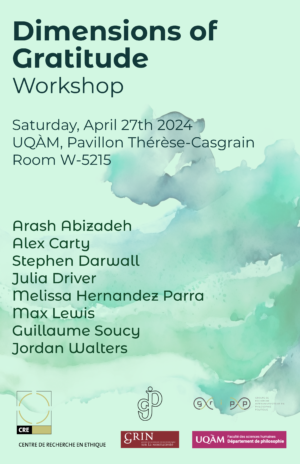

8ème séance du groupe de lecture en philosophie de l’économie
Séance de discussion sur le texte de Marc Fleurbaey « Workplace Democracy, the Bicameral Firm, and Stakeholder Theory » (2023), paru dans Politics & Society.
La séance se tiendras en mode hybride : Marc Fleurbaey sera présent sur Zoom.
Pour participer ou recevoir le lien Zoom et /ou le texte par courriel, contactez les organisateur.ices (Morgane Delorme: morgane.delorme.1@umontreal.ca; ou Gabriel Monette: gabriel.monette@hec.ca).
Colloque Logement et justice sociale à l’occasion duquel les conférencier.es exploreront et discuteront de l’intersection entre les questions de logement, de droits de propriété et de redistribution et d’héritage, dans le contexte des préoccupations de justice sociale.
Organisé par Alexandre Petitclerc (Université de Montréal) et Christian Nadeau (Université de Montréal) en partenariat avec le Centre de recherche en éthique (CRÉ), le Groupe de recherche interuniversitaire en philosophie politique (GRIPP), la Faculté des Arts et Sciences de l’Université de Montréal et le Département de philosophie de l’Université de Montréal.
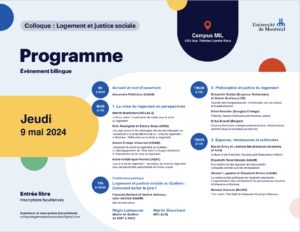
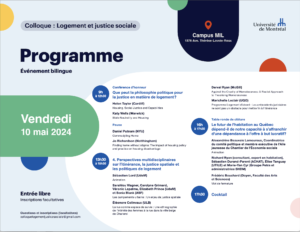
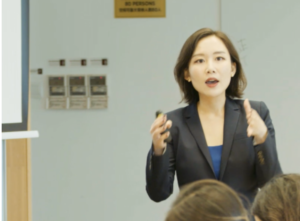
Dans le cadre des conférences du midi du CRÉ, Julia D. Hur (NYU) nous offrira une présentation intitulée « Money on Mind: Performance Incentive, Attention to Money, Environmental Sustainability ».
Pour y participer via Zoom, c’est ici.
Résumé
Environmental sustainability is one of the most pressing problems of our time, raising significant questions as to how to motivate organizational decision-makers to make substantive investments in environmental protection. The current work identifies performance incentives as a critical barrier that prevents organizational decision-makers from supporting sustainability initiatives. We also offer a novel psychological mechanism of how monetary incentives activate managers’ attentional fixation on money, intensifies their zero-sum mindset, and ultimately undermines commitment to investing in sustainability. Across two laboratory experiments (n = 702) and one archival study with a combination of data on executive compensation, corporate annual reports, and environmental performance (n = 14,126), we show that decision-makers whose pay is more contingent on financial performances are more likely to develop attentional fixation on money and less likely to support sustainability initiatives of their organization. Together, our findings demonstrate a novel pathway of how one of the most prevalently used types of financial incentives inadvertently undermine progress toward one of the most urgent organizational changes.

Nous recevrons Richard Healey (LSE) dans le cadre des conférences du midi du CRÉ. Richard nous présentera ses travaux sur les promesses immorales.
Pour y participer par Zoom, c’est ici.
La présentation sera donnée en anglais, mais les questions pourront être posées en anglais ou en français.
Résumé
It is a familiar part of common-sense morality that we are duty bound to keep our promises. However, the creative nature of promissory duties – the fact that the promisor and promisee choose the content of the promises they make – prompts a natural question: Are there substantive constraints on the content of the promises we can make? For instance, can we make binding promises to murder, maim, and steal? Many have the intuition that such promises fail to bind. Taking this intuition as my starting point, this paper develops a novel account of the nature and explanation of the constraints that apply to our power to promise. Most existing views attempt to explain these constraints by appeal to independent duties to which the promisor or promisee are subject. Yet while initially appealing, these views struggle to achieve extensional adequacy, and lack a clear rationale. On the account that I develop, we should instead appeal to the values that underpin the power to promise itself. I argue that a promise creates a form of special relationship between promisor and promisee, and the constraints that apply to that power track the value of this promissory relationship.
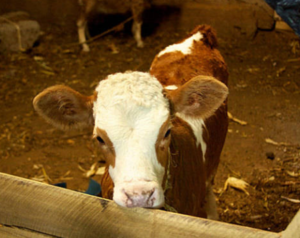
Les membres du CRÉ et du GRÉEA sont heureux.ses d’accueillir Angie Pepper (University of Roehampton) et Richard Healey (LSE), qui nous offriront une présentation intitulée « Animals, Inferiority, and Abolition ». La présentation sera offerte an anglais, mais les questions posées lors de la période de discussion pourront l’être en français ou en anglais.
Pour y participer par Zoom, c’est ici.
Résumé
In The Pecking Order, Niko Kolodny argues that natural persons have an irreducible claim against inferiority: a claim “that we not be set beneath another in a social hierarchy” (p. 5). Such social hierarchies, Kolodny suggests, are constituted by untempered disparities in power, authority, and regard. Though Kolodny acknowledges that the lives of many social animals are organised around the “pecking order” (p. 1, p. 87), other animals barely feature in his analysis of relations of inferiority. This omission is striking because many of our relations with nonhuman animals, especially those who have been domesticated, do not arise in “chance, one-off encounters”, but are rather “entrenched in an established, ongoing social structure” (p. 98). Think, for example, of our relations to livestock animals, laboratory animals, and pets. In each of these cases, animals are systematically subordinated by a pattern of social and legal norms that involve untempered asymmetries in power, authority, and regard.
These observations raise the question: Do non-human animals have a claim against inferiority within human-animal communities and hierarchies? In this paper, we argue that they do. Moreover, we suggest that nonhuman animals’ complaint against inferiority supports an abolitionist approach to animal rights. The basic idea is that to fully respect the rights of other animals, we must desist from using them as means to our ends. Importantly, the claim against inferiority not only supports the abolition of practices that clearly cause animals suffering but also those that need not, such as pet keeping.
The paper is structured as follows. First, we defend the claim that sentient nonhuman animals can have claims against inferiority against humans. We consider the view that only those capable of adequately recognising their position within a social hierarchy can have claims against inferiority. In response, we observe that while one’s ability to recognise one’s social position will likely have implications for what constitutes appropriate treatment, nothing in Kolodny’s account necessitates a recognition condition for the claim against inferiority. We further argue that the lack of a recognition condition is independently plausible if we wish to allow, for example, that young children in lower castes and individuals with severe cognitive disabilities can have claims against inferiority. Second, we argue that some nonhuman animals do have claims of inferiority against us. To illustrate this we show that animals have a complaint against being socially positioned as pets, which is grounded in a claim against inferiority. Specifically, we contend that the practice of pet-keeping is a socio-political institution which is constituted by untempered asymmetries in power, authority, and regard between humans and nonhuman animals. Furthermore, we argue that it is not possible to effectively temper these asymmetries while maintaining the practice of living with pets. This is because the tempering factors that undercut objections to social hierarchy in the human case (see Kolodny §5.2 and Ch. 8) either cannot be made to work for other animals (e.g., democratic governance) or otherwise require that the practice be dismantled. If our argument is correct, the implications are significant. Not only does this give us a further reason to abandon practices that harm other animals such as farming and biomedical research, but it suggests that the seemingly more benign practice of keeping animals as pets should be abolished.

Workshop: Animal ethics and AI ethics: how do they intersect?
Co-organized by Ophélie Desmons (INSPE Paris, Sorbonne University) and Martin Gibert (Université de Montréal).
With the support of GREEA (environmental and animal ethics research group), CRÉ (Centre de recherche en éthique) and UMR 8011 « Sciences, Normes, Démocratie », Sorbonne University.
Call for papers.
Location and zoom link to come.
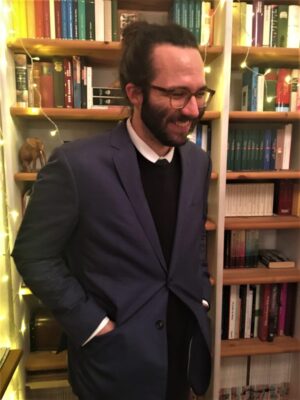
Dans le cadre des activités du Réseau de philosophie du travail, W. Jared Parmer (RWTH Aachen University) offrira une présentation intitulée: « Meaning and Alienation in Work ».
Les activités du Réseau de philosophie du travail sont ouvertes aux chercheur.es et aux étudiant.es diplômé.es ayant des intérêts de recherche dans ce domaine. Merci d’écrire aux organisateurs, Denise Celentano (denise.celentano@umontreal.ca) et Pablo Gilabert (pablo.gilabert@concordia.ca), pour recevoir le lien zoom.
Résumé
In this talk, I give a synoptic view of philosophical treatments of meaning in work, and how these treatments point to varieties of alienation in work, too. I suggest that there are neoliberal, liberal, and perfectionist approaches of meaningful work. These approaches distinguish themselves by how they answer two key questions: first, must meaningful work be in some way objectively good? and, second, is work somehow special when it comes to living a meaningful life? They generate different paradigm cases of alienated work as the opposite of meaningful work. I will finally offer some reasons for why I, tentatively, endorse a perfectionist approach to meaningful work.

Junior Thierry Tatsi Tsifo nous offrira une présentation intitulée « L’urgence autour de la libre disposition de son corps : repenser le ‘contrat’ grâce à la gestation pour autrui » dans le cadre des Midis de l’éthique du CRÉ.
Pour y participer par Zoom, c’est ici.



